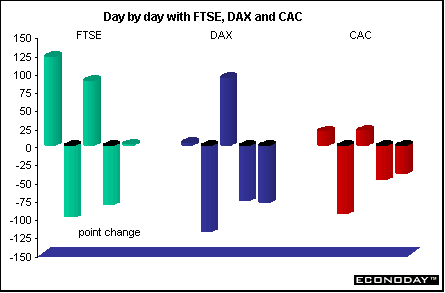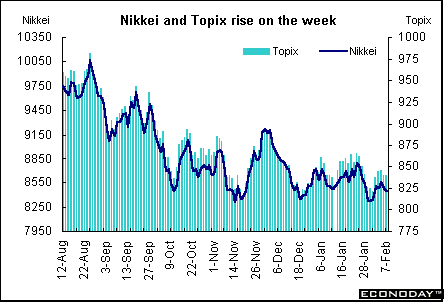 |

Europe and Britain
The euro has now appreciated by 10 cents against the dollar in the last three months, reaching its highest level in three years. The European Central Bank says this is good because it makes imports to the eurozone cheaper, which in turn helps keep down inflation. But for investors in European stocks this is not good news. The bigger European companies on average get about 20 percent of their revenues from the U.S., so the dollar-denominated profits inevitably take a blow. (A higher currency value lowers profits when repatriated, which especially hurts the profits of dominant exporters. This is why Japan frets about the high value of the yen.) While the ECB has been willing the euro higher, major exporters have wished the reverse. Those that export a lot out of Europe into non-euro regions also suffer, such as carmakers, especially those that have moved production to non-European locations. Chemicals companies tend to suffer, too, as does the industrial goods sector in general.

The FTSE surged more than 100 points last Monday buoyed by a relief rally in financial stocks after the Financial Services Authority relaxed its rules on solvency requirements for life assurance companies. In an announcement late Friday, Jan. 31, the FSA recognized the weaknesses of its statutory solvency approach for life companies and said it would base its new guidelines on a broader definition of liabilities. The move helps to correct a big structural issue that has been driving the market down. Forced selling of equities by insurers is the reason why the London market has fallen further this year compared to its peer international indexes. But the FSA's move was not seen as a panacea for the market's problems. Uncertainty, both geopolitical and over economic growth, has further delayed already anemic business investment. This combined with concerns that consumer confidence could weaken further continued to weigh on the market.
Asia
Asian shares continued to slump as anxiety about Iraq and North Korea continued to upset investors. In Japan, confidence in the market is being eroded further by persistent selling of blue-chip shares by banks and insurers, which are realigning their balance sheets in the run-up to the end of the fiscal year on March 31, 2003. The country's economy minister has called on his cabinet colleagues, including the prime minister, to start buying shares in a desperate bid to prop up the Japanese stock market as the fiscal year end looms. Japan's economy has been lingering near recession and the Nikkei has been hovering near 19-year lows since last year. On the week, all Pacific-Asian indexes followed here fell with the exception of the Nikkei and Topix.



Last Week's Highlights • Global Stock Market Indexes • Recap of Global Markets • Currencies • Indicator Scoreboard

The Bottom Line • Looking Ahead
|
 |